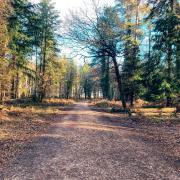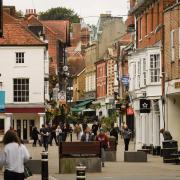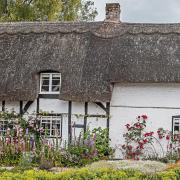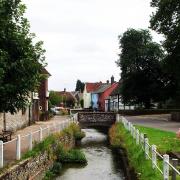With Hampshire’s heritage rooted in the countryside, Manor Farm in Bursledon continues to bring the past to life for new generations. Viv Micklefield dons wellies and takes a closer look
“You wouldn’t believe it. Until they come here, some children have no idea that milk is from a cow,” says Phil Halliwell pausing to check on Buttercup, one of the bovine residents, who’s expected to calve any day.
The Manor Farm business manager juggles financial spreadsheets, site development and visitor numbers, but having started as a countryside ranger over two decades ago, the daily realities of a working farm are still in his blood.
Phil speaks for himself and others when he says: “There’s a great love for this place.” Looking out from the 18th century threshing barn, which now serves as the farm entrance, he admits with pride: “It’s a picture postcard scene and one that’s unique to Hampshire.”
This owes much to the tapestry of heritage buildings which sit harmoniously in front of the medieval farmhouse. Many, like the granary, were part of the local landscape or, as in the case of the wheelwright’s workshop, have been reassembled here from elsewhere in the county. Changes brought about since 1984, when Hampshire County Council opened the farm as a family friendly attraction within the neighbouring country park, whose banks hug the River Hamble.
As Phil reveals, a pond so old that it’s mentioned in the Domesday Book and the now deconsecrated St Bartholomew’s Church, are reminders that this was once the centre of Botley (currently a mile-and-a-half down the road). So, there’s a real sense of history here. Yet the farm, which these days has a distinctly Victorian flavour, is not immune to the realities of modern-day animal welfare. Avian flu outbreaks elsewhere require poultry to be penned until the all-clear is given. And animal observation, under veterinary guidance, is a major part of the daily routine.
Dan George, the farm’s assistant ranger, says: “We have to do everything that a normal farmer does. There might be fewer animals but there’s the same paperwork as for a much bigger herd. Plus, we’ve got the public here which adds an extra element to our work.So we’ll also do milking demonstrations and farmyard walks. It’s getting busy here now with everything springing into life.”
As well as the apple blossom in the orchard, and the maize maze taking shape, this means plenty of new arrivals for farm apprentice Beth King to take care of. “I volunteered here for a year and am now on a two-year apprenticeship going to Sparsholt College once a week; it’s good fun as you get to learn new things and then do all the practical stuff,” says Beth. “I like working outside and being with the animals, cleaning and feeding them. And I get to drive a tractor.”
Working alongside Beth today is Maura Knight, who’s been a casual farm worker and volunteer at Manor Farm for over 10 years and is used to a hands-on approach. “I was brought up in rural Ireland so am familiar with doing things manually. My dad cut hay using a scythe,” says Maura. “Coming here helps you to feel less stressed about things.”
Keeping warm inside the pig poke, Phil points out the reclining Gloria and her litter of Gloucester Old Spot. Once weaned most of the piglets will be sold, whilst mum and a few of the females get to enjoy “a privileged life” in the fields. Appropriately, the Hampshire Saddleback is also reared and having been adopted as the farm’s official logo, can be glimpsed on the weather vane atop the thatched barn. Forged by onsite blacksmith Gary Bull, it’s one of the countryside skills that visitors can view close-up at weekends.
There’s more to see inside the farm cottage, familiar to many as the backdrop to the BBC series Wartime Farm, where social history demonstrator Alison Mills, aka Miss Jean Stubbs, ‘lives’. “As domestic staff, as opposed to farm workers, we call ourselves by our house names which took some getting used to when I first started nine years ago,” admits Alison. The former teacher can turn her hand to everything from baking biscuits on the blackened range to sewing rag rugs. She also helps to recreate the farm’s Victorian schoolroom for younger visitors.
“I lose my Hampshire accent once I go into the classroom and become terribly prim and proper,” Alison laughs, before throwing out the tongue-twister: “There are 30,000 feathers on a freckled feathered thrush.” Try saying that after drinking some of the cider sold in the farm gift shop where, thanks to Fareham and District Beekeepers’ hives, Manor Farm honey is available to buy, as are fresh eggs.
With annual running costs of £50,000, the farm needs to pay its way. Phil confirms that with upwards of 80,000 visitors each year, becoming financially self-sustainable is achievable. This will also be thanks to volunteers, like Maura, and to the student and community payback workers who assist in maintaining the vintage tractors and gardens.
What’s refreshing is that Manor Farm retains an integrity, which avoids it becoming a theme park. As receptionist Jean Handley Greaves says, it’s not unusual to see three generations of the same family walking around. “We still retain the farm’s old fashioned charm,” she says. And the wider country park too holds plenty of attractions. “Parents bring their children after school. Mums with little ones meet up for a coffee in the café, and, of course, you can go crabbing by the river.”
For farm staff, who might be on call night and day to monitor an animal, it’s a life they seem to relish. And Buttercup? She gave birth to a healthy calf a few days later.
hants.gov.uk/countryside/manorfarm
More…
• Hampshire walk around Frogham - Follow Steve Davison as he heads to the New Forest for a dog-friendly wander around Frogham, visiting the Latchmore Brook, Hampton Ridge and Abbots Well



























